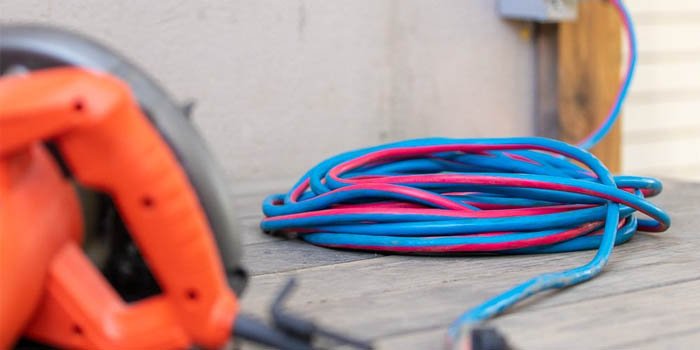Extension cords are an excellent asset for every home. They are incredibly convenient when you want to supply power to any electrical appliances away from any power point in your home. It may not be possible to keep a power connection at every corner of the house.
Your appliances also may have a short electrical cord, which may prevent you from shifting your belongings in your house. Some houses may not have enough power outlets to satisfy the power demands of the homeowner, which can become a problem.
Extension cords provide an efficient solution for this problem while also being cost-effective. An extension cord can give access to connecting several appliances by accessing power from a single source.
Extension cords experience heat in its wires when electrical current transmits through it. When more power than the capacity of the cord passes through the wires, it overheats and melts the insulation caui\sing short circuit and fire. This article will discuss the importance of buying the right extension cord for your home is.
What is The Importance Of Buying The Right Extension Cords For Your Home?
1. Length of the Cord
Extension cords come in plenty of shapes and sizes. Buying a longer cord than what you consider that you require is always the safer option. The length of the cord affects the amount of voltage drop that occurs during current transmission.
Longer cords allow you to avoid plugging extension cords on one another to reach a room or appliance, which is a dangerous practice. However, longer extension cords tend to have lower power ratings than short extension cords due to voltage drop.
Connecting an extension cord on another extension cord will result in additional resistance and heat to build up in the circuit. The heat and resistance may cause the electrical appliance to run at lower power or may start a fire by melting the insulation on the wire.
2. Check Power Ratings
The thickness of the wire of the extension cord gives a measure of the amount of power that it can carry without heating up. You can check the power rating on the copper wire and identify the power capacity by checking the American Wire Gauge (AWG) number.
Larger numbers on AWG means a lower power capacity, and a smaller number indicates a high power capacity. You need to choose an extension cord that has a more power rating than the total of the appliance that you intend to connect to the extension cord.
3. Check The Usage Environment And Plug Type
You need to choose the power cords according to the purpose that you intend to use it. Power cords that you use outdoor in constant exposure to sun or at a place where it may get wet may require different types of extension cords.
The outer layer enclosing the wire is also known as a jacket. The jacket protects the wire from the outside environment, such as high temperature, moisture, and many more. The jacket on the wire has a set of letters on it indicating the properties of the jacket.
The plug types that are compatible with an extension cord may also vary. While some may support only two-pin plugs, others may support three pins. The appliances that you purchase from different countries also use diverse shapes of plugs, and an extension cord can help you in providing power to such appliances also.
4. Understanding The Types Of Extension Cords
1. Light-Duty Extension Cords
Light duty extension cords have thin wires, and often these power cords do not have grounding. Light duty cords typically support only two hole plugs as they do not support grounding. You can use only the appliances which use minimum power with these extension cords.
2. Medium Duty Extension Cords
Medium duty extension cords have a grounding feature and have three-hole plug points. These extension cords can support household appliances with moderate power usage such as television and computers.
3. Heavy Duty Extension Cords
Heavy-duty extension cords can support the power of up to 30 amperes and also have a third wire for grounding. These extension cords are useful for powering tools and heating appliances.
You can consider buying a nema 5-15 if you are unsure of your total power output needs. These high capacity extension cords are also handy if you want to connect several appliances at the same time with the extension cord.
4. Outdoor Extension Cord
When using extension cords outdoors, ensure that the cords are ground fault circuit interrupter (GFCI) type or the extension cord has built-in GFCI protection. Extension cords have a ‘W’ designation on them, which signifies that it is eligible for outdoor use.
Conclusion : You need to follow specific guidelines for using your extension cord for safeguarding the safety of your family and home. Each year there are several reports of fire hazards erupting in homes due to the improper use of extension cords.
Most consumers are unaware of the dangers of improper power cord usage, and they connect appliances that require total power output, which is more than the power rating of the power cord. Do not overload the extension cord by powering appliances more than its capacity.
Unless your home has an abundance of power outlets in every corner of the house, you will require the use of extension cords. However, you need to consider the power ratings of the extension cord to match your power needs for ensuring safety.
Never use a damaged power cord and unplug the cord and store it in a safe place when you are not using it to safeguard the safety of your family. If you are using any tool by powering on an extension cord, ensure that you plug only one tool per extension cord to prevent overloading.
